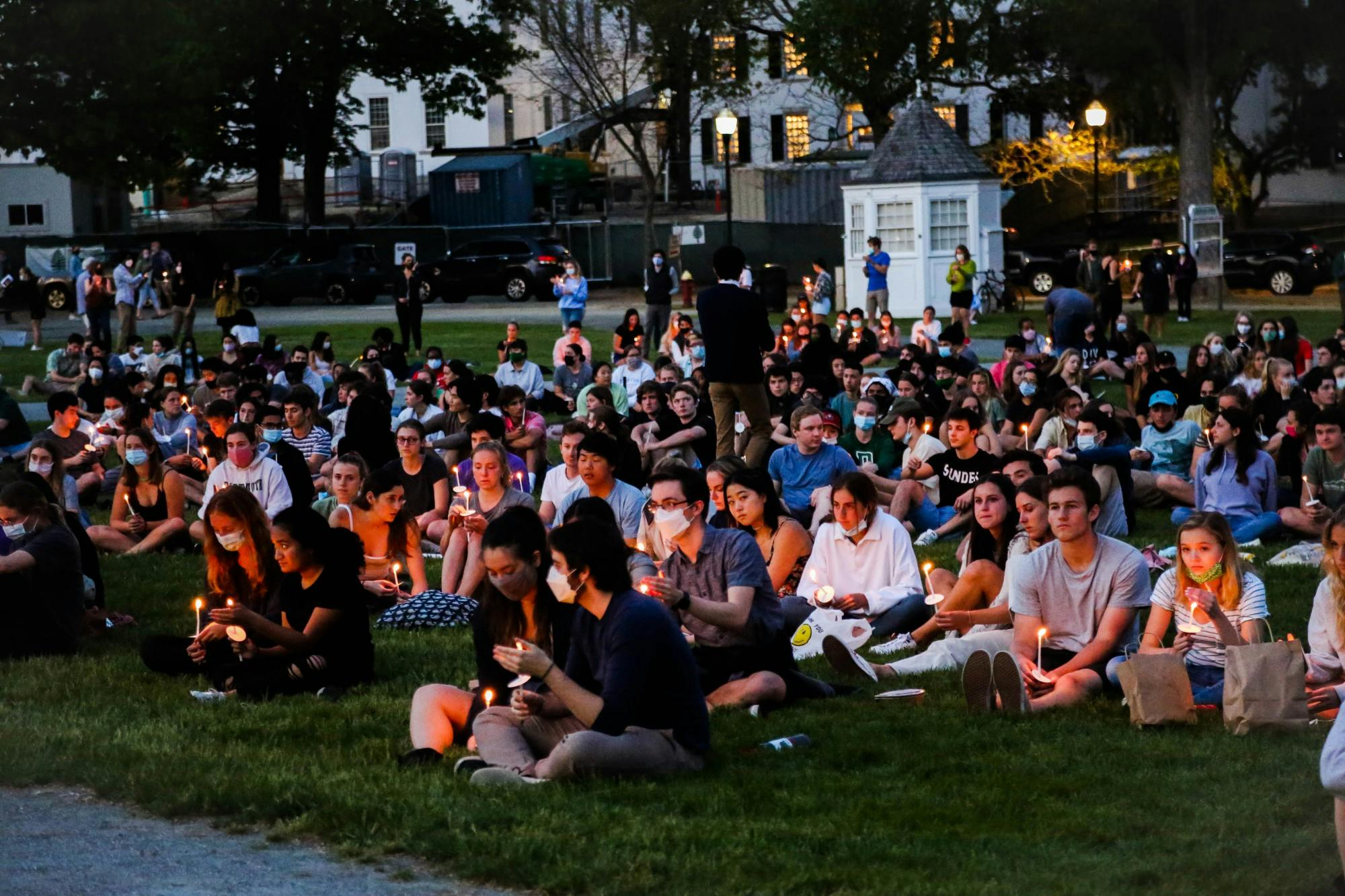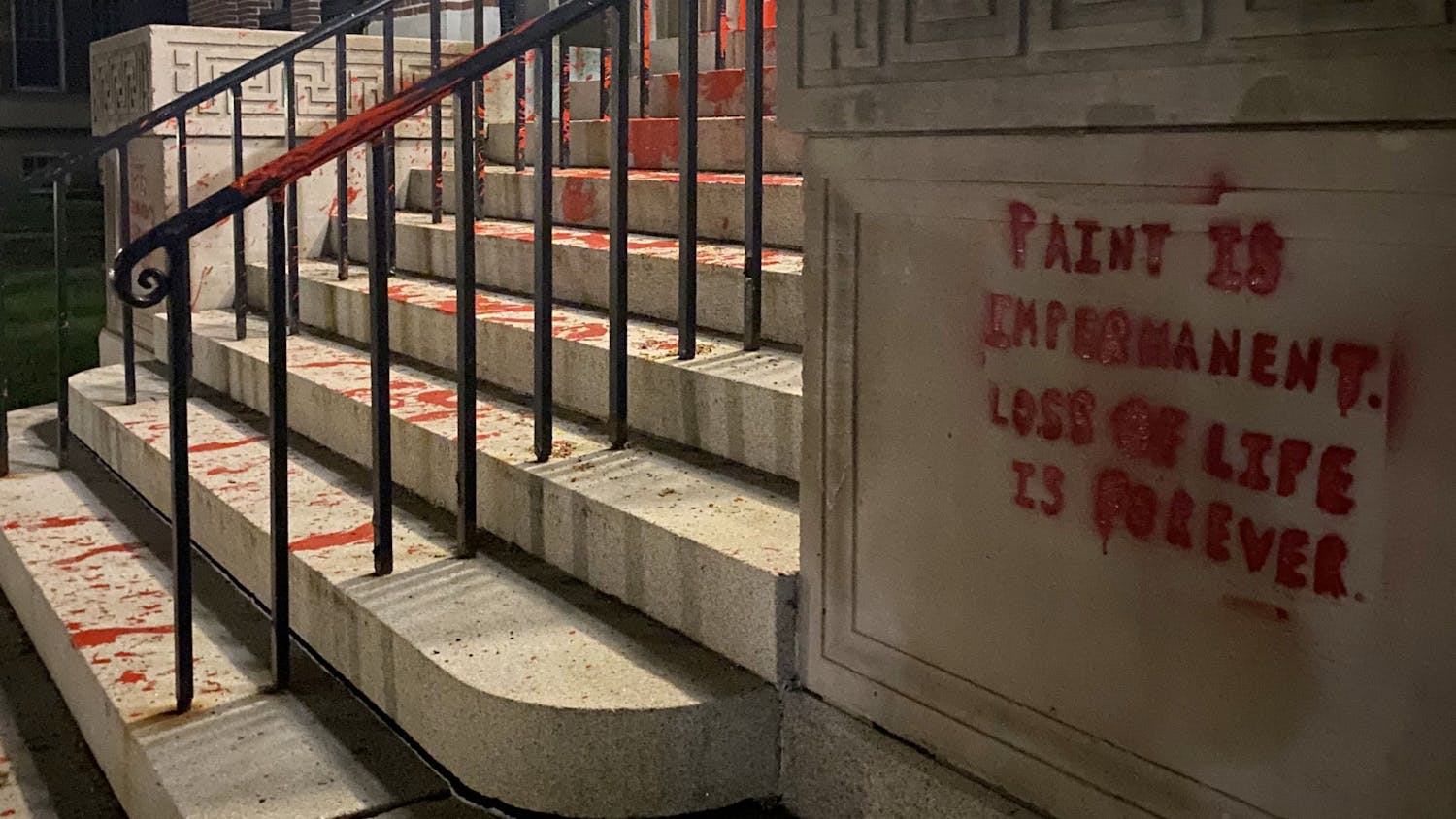On Tuesday evening, over 1,000 Dartmouth community members attended Dartmouth Remembers, a candlelight vigil commemorating the lives of the four undergraduate students who have died this academic year: Beau DuBray ’24, Connor Tiffany ’24, Lamees Kareem ’22 and Elizabeth Reimer ’24. The event, held on the Green, was recorded and posted on the College’s YouTube channel.
Chaplain of the William Jewett Tucker Center Daveen Litwin began the event with a call for unity, asking those in attendance to “remember, honor, lift up, hold up and see our sense of shared humanity.” She also noted that the community also “remember[ed]” George Floyd on the one-year anniversary of his murder.

College chaplain Daveen Litwin led the vigil.
After Litwin’s opening remarks, students close to the undergraduates who have died gave speeches commemorating the lives of their friends.
Jonathan Cartwright ’24, who spoke in memory of DuBray, remembered him as a “selfless and thoughtful” friend who “will not be forgotten.”
Jack Heaphy ’24, who was accompanied by four other students, said that Tiffany was a compassionate person with “light in his eyes,” and Eleanor Schifino ’24 said that Tiffany was the “kindest, most selfless person.”

Student speakers spoke in memory of the four undergraduates who died this year.
Recalling Reimer, David Katz ’24 said that she was an “enchanting, indescribably wonderful” person who wanted to “make others love themselves.”
Francesca Wood ’22 recalled meeting Kareem during her freshman fall and described her as a “clearly incredibly smart” person who was also “genuine, open-minded [and] self-aware.”
After students shared their memories, Litwin thanked the students speakers for their memories of the four undergraduates who died and asked the community to maintain “courage...hope… [and] love.” Litwin then lit her candle, while the students who spoke at the event walked across the Green to light candles distributed to students in attendance. As students shared their flames with one another, the Dartmouth Rockapellas performed two verses of the song “Testimony.”

Students passed the fire around to light their candles.
Following the Rockapellas’ performance, College President Phil Hanlon delivered brief remarks.
“Four precious lives, four bright lights, were lost way too soon for any of us,” Hanlon said. “I wish I had the words to express the pain and the grief that we’re experiencing, but I don’t. Words fall short.”
He finished by reading an excerpt of a poem by Pulitzer Prize winner N. Scott Momaday titled “In the Time of Plague.”
South House Senator Anthony Fosu ’24 spoke after President Hanlon. In his speech, Fosu said that Dartmouth is living through “a moment of multiple pandemics.”
“On this day, we remember Beau...Connor… Lamees… [and] Elizabeth,” Fosu said. “And on this day, the one year anniversary of the murder of George Floyd, we recognize the pandemic of racial injustice, the pandemic of pestilence that has continued to stalk our world for well over a year, and the pandemic on this campus in this mental health crisis we are facing.”
At the end of his speech, Fosu led the community in a moment of silence.
At around 8:45pm, Litwin delivered a final address, thanking those in attendance for “being in community” as well as the Rockapellas, President Hanlon and the students who had spoken. As the vigil ended, the bells from Baker-Berry Library rang once for each of the four students who died this year.

Baker Tower went dark with the exception of the green light.
In an interview after the vigil, Litwin said that students were “yearning” to commemorate the deaths of students in-person “for a long time,” but the College was unable to hold a ceremony due to COVID-19 restrictions. According to director of institutional events and logistics Jim Alberghini, who helped Dartmouth secure a permit from the Town of Hanover for the vigil, the College’s senior leadership met on May 21 with Town manager Julia Griffin to discuss holding the event and to explain the importance of the event for students.
Alberghini said that during the meeting, the College discussed following “appropriate” COVID-19 guidelines with the Town. He added that the event was approved in part because the Town recognized the importance of the event for students.
“The Town recognized that our student community has gone through a difficult time and that coming together in this way would offer students a way to heal and come together as a community,” Alberghini said.
After the meeting, a member of Griffin’s staff told Alberghini to submit a request for an outdoor activities permit, which was submitted over the weekend, according to Alberghini. On May 24, the town approved the permit to hold the vigil, which Alberghini noted is the largest in-person event the College has held during the pandemic.
Griffin wrote in an email statement that the town approved the event “with some significant concern about crowd management, the need to insure that social distancing was maintained and that masks were worn.”
Litwin added that the Tucker Center was “very involved” with preparing the candlelight vigil. The candles, according to Litwin, were provided by the Tucker Center, although student workers from Collis Center helped distribute them during the vigil. Regarding the participation of the Rockapellas in the vigil, Litwin said that she decided to have the group sing due to their “mission” to spread social justice through music.

Students sat in silence while holding their candles.
In an interview prior to the event, Sara Lockwood ’22 said she hoped that the event would be “authentic to Beau and as positive of a [vigil] for his family as possible.” Lockwood, who was Beau’s Orientation Peer Leader, said that she was worried that the event would center too much on the administration but hoped that it would be a “really positive space for students.”
“I think that some of the concern about this [vigil] is that the focus would be more on the admin trying to make up for their failures, rather than actually being with students and remembering the students [who have died],” Lockwood said. “But at the same time, I think that the vigil also provides an opportunity for people to come together in community. I just really hope that it goes that way.”
Afterwards, Lockwood said in an email statement that she was “pleasantly surprised” by the vigil, noting that it was a “powerful healing experience.”
In an interview after the vigil, Katz said that he spoke at the vigil in part because he noticed that people were discussing “assumptions” about Reimer’s death on platforms such as Librex and “oversimplifying” her story, adding that he wanted to speak in order to demonstrate that “she was much more than that.”
“I felt that because I had so much to say about her — her beauty and everything like that — that I needed to speak and I needed to make [her story] clear, [and show] just how much of an affecting person she was to so many people,” Katz said.
Katz said he thinks by “lumping” all four students in a vigil, the College “simplifies” the students’ deaths. Katz also criticized Hanlon’s presence at the vigil after he “denied us a day off of classes,” referring to the College’s decision to reject legislation proposed by Student Assembly that would have cancelled classes for all students on the day of the vigil and for the Class of 2024 on the following day.
“[The administration] is really lacking in understanding that this is a community loss — even though they put events like this together to claim that they understand, but they truly lack that empathy,” he said.
Despite his grievances, Katz said that he was appreciative that the vigil took place, noting that he was especially touched by the turnout.
“I'm very grateful that the community turned out,” he said. “It really warmed my heart to see so many people there. Seeing all those candles was a beautiful sight.”
Daniel Modesto ’24 is the News executive editor. He is from Brooklyn, New York, and is a Native American and Indigenous Studies major modified with Latin American, Latino and Caribbean Studies.




